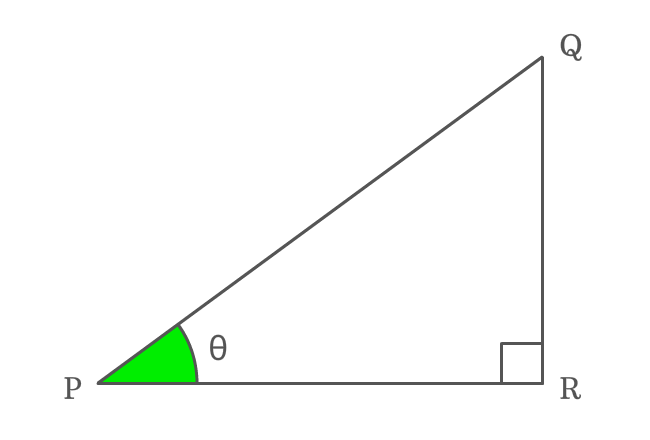$\csc{\theta} \,=\, \dfrac{1}{\sin{\theta}}$
Sine is a ratio of lengths of opposite side to hypotenuse and the cosecant is a ratio of lengths of hypotenuse to opposite side. The sine and cosecant functions are mutually reciprocals. Therefore, the reciprocal of sin of angle is equals to cosecant of angle.
$\Delta RPQ$ is a right triangle and its angle is theta.

Firstly, write sin of angle theta ($\sin{\theta}$) in its ratio form.
$\sin{\theta} \,=\, \dfrac{QR}{PQ}$
Similarly, write the cosecant of angle theta ($\csc{\theta}$ or $\operatorname{cosec}{\theta}$) in its ratio form.
$\csc{\theta} \,=\, \dfrac{PQ}{QR}$
The value of cosecant function in its ratio form can be written in reciprocal form to prove the relation between sine and cosecant functions mathematically.
$\implies \csc{\theta} \,=\, \dfrac{1}{\dfrac{QR}{PQ}}$
$\,\,\, \therefore \,\,\,\,\,\,$ $\csc{\theta} \,=\, \dfrac{1}{\sin{\theta}}$
Therefore, it is proved that the reciprocal of sin function is equal to cosecant function. It will be used as a formula in trigonometric mathematics.
The angle of right triangle can be represented by any symbol and the reciprocal identity of sin function should be written in the respective angle.
For example, if $x$ is angle of right triangle, then
$\csc{x} \,=\, \dfrac{1}{\sin{x}}$
Similarly, if $A$ is angle of right triangle, then
$\csc{A} \,=\, \dfrac{1}{\sin{A}}$
The reciprocal identity of sin function is written in this form but the only changing factor is angle of right triangle.
A free math education service for students to learn every math concept easily, for teachers to teach mathematics understandably and for mathematicians to share their maths researching projects.
Copyright © 2012 - 2025 Math Doubts, All Rights Reserved